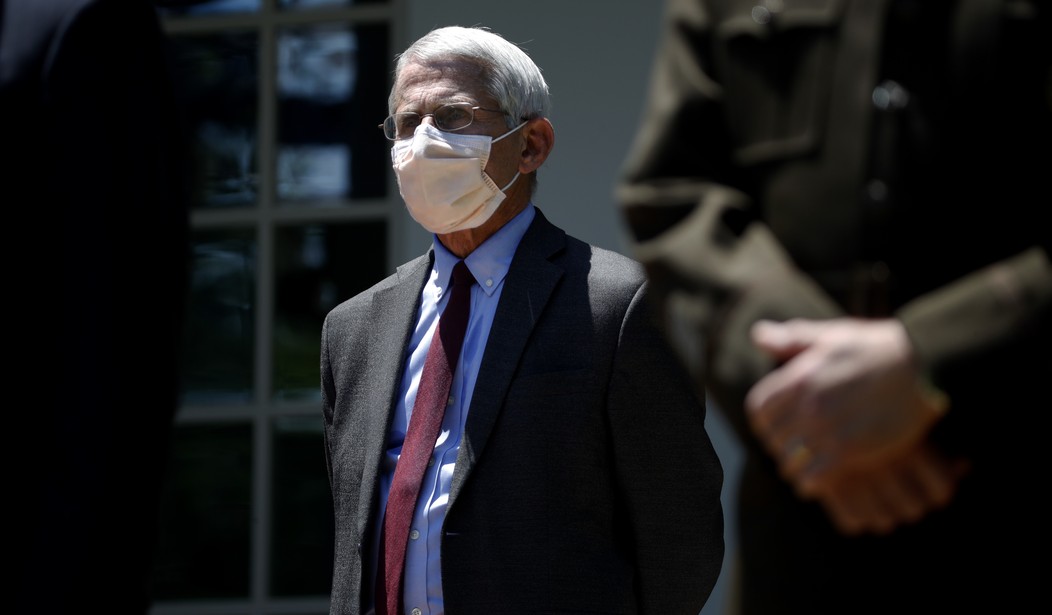He's been warning Americans about the near-inevitability of a second coronavirus "wave" in the fall for weeks now, but in a new interview with CNN, Dr. Anthony Fauci sounds freshly optimistic that such a fate is not necessarily set in stone. This assessment comes on the heels of another comment that garnered considerable attention, in which Fauci acknowledged the "irreparable damage" that could be inflicted by ongoing economic lockdowns. Skip ahead to the 3:25 mark for Fauci's new thoughts on averting the second wave scenario, backing away from his April assertion that he was "convinced" that "we will have coronavirus in the fall":
"We often talk about the possibility of a second wave, or of an outbreak when you reopen. We don't have to accept that as an inevitability...Particularly when people start thinking about the fall, I want people to really appreciate that it could happen, but it is not inevitable."
Perhaps more effective treatments or vaccines will start to become available, or perhaps better testing and tracking protocols will catch, contain and extinguish outbreaks early (maybe even using, um, human feces as a highly indicative leading warning sign). Elsewhere in the interview, Fauci also stated that he's increasingly persuaded that using Hydroxychloroquine as an anti-COVID therapeutic -- as frequently promoted by President Trump -- is not effective:
Fauci said Wednesday that “the lack of efficacy” for anti-malaria drug hydroxychloroquine, which has been touted by Trump as a game-changer against the coronavirus, is clear. A study published Friday in medical journal The Lancet found that hospitalized Covid-19 patients treated with hydroxychloroquine had a higher risk of death than those who didn’t take it. Earlier Wednesday, France said it banned the use of the potential treatment. On Monday, the World Health Organization said it temporarily suspended its trial of hydroxycholoroquine over safety concerns.
One of the hypotheses I've seen suggests that the drug can be helpful to patients earlier on in the process, or with milder symptoms -- though some people who were suffering from severe Coronavirus credit the drug with their survival and recovery. While some of the studies mentioned above certainly do not look hopeful, a recent study out of NYU found that COVID patients treated with a Hydroxychloroquine cocktail were substantially more likely to recover. At best, the results are mixed. Meanwhile, other treatments have been showing better promise, as have several vaccine candidates in trials. Here's Dr. Scott Gottlieb explaining why it's likely that the US and the West will produce vaccines that are more effective, and do so faster, than China:
Recommended
U.S VACCINE RACE: @WhiteHouse officials and public health experts appear optimistic the U.S. will be able to develop a #COVID vaccine quicker than China.
— Face The Nation (@FaceTheNation) May 24, 2020
Watch as Robert O'Brien and @ScottGottliebMD explain why ---> pic.twitter.com/ec2dHtxg9v
I'll leave you with a chart that further suggests that critics' predictions of doom in reopening states have largely been disproven by actual data so far (although we should keep a sharp eye on outcomes as phased re-openings progress), as well as Sean Hannity's admonition to pool partiers in Missouri who also drew a rebuke from Fauci in the clip above. Mask-wearing, especially indoors and in close quarters, does not need to be a partisan issue or a matter of tribal signaling:
Fun chart from @TheStalwart's newsletter. We're almost a month into re-opening in Georgia / Texas / Florida, at what point is it safe to say it's working well & was misjudged by critics etc? (green = sit-down restaurant diners, red = growth in covid cases) https://t.co/XPLfhEMjgk pic.twitter.com/ZdKgRlag5z
— Tom Gara (@tomgara) May 27, 2020
Protecting vulnerable seniors is a top humanitarian imperative during this pandemic, but also a political challenge for leaders, including the president.

























Join the conversation as a VIP Member